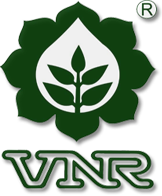Back
History of VNR
’Good Seeds, Better Yield'. This is the promise VNR makes and keeps to fellow farmers . And VNR's dedication to this vow comes from the history behind the making of this company and from the experiences of its founder, Dr. Narayanbhai Chawda, a farmer himself, who realized the hard way the importance of quality seeds.
Before the Beginning
Krishi Pandit Narayanbhai Chawda came from a family of farmers. His father had a self-sufficient vegetable farm in Gomchi, currently in Chhattisgarh, where Narayanbhai grew up nurturing his passion for agriculture. In 1964, Narayanbhai graduated with a bachelor‘s degree in agriculture from Allahabad Agriculture Institute, Allahabad. He was the first ‘qualified’ farmer in the family. That was a time when vegetable farming was done traditionally. There was no use of technology of any kind, be it in sowing, irrigation or storage.
Reality Bites
Narayanbhai soon discovered the gaping divide between the theories he had been taught and the methods practiced in reality. The first rude shock came when an entire lot of crop suffered because of poor quality seeds unknowingly purchased by his father. He also noticed that the seeds were often of mixed variety and there was no uniformity in the yield.
On His Own
The young agriculture graduate got to work. He began to work on improving the seed quality by selection and then multiplication of the ones that came from the best yield. In 1967, he began working in earnest on Sem (a variety of bean) seeds. The green swollen variety of Sem is in great demand all year round. However, the variety grows only in winter and Chhattisgarh doesn‘t have a conducive climate for it. The non-season bound variety is white, flat and bushy. After five years of research and cross-breeding on his own, Narayanbhai succeeded in developing seeds which yielded non-season bound, green, bushy and swollen Sem.
No Looking Back
Overwhelmed by the breakthrough and eager as always to share his success with fellow farmers, Narayanbhai wrote about his work and tried to get it published. There were very few takers and lot of convincing needed to get the articles published. Narayanbhai stopped writing and decided to concentrate on research. In 1970, Narayanbhai made his first foreign trip to Japan as a representative of Bharat Krishak Samaj to study paddy cultivation. However, the language problem began to make things difficult for him. Till he came up with an idea - "There must be local trains here", he thought. And local trains always reach out to the suburbs and rural areas, he reasoned. Narayanbhai boarded a train and sure enough landed up in villages where he observed first-hand vegetable and paddy cultivation.
The Seed is Sown
However, it was only in 1993 when Narayanbhai's son Vimal joined him after getting his agricultural degree that VNR was formally launched.
Spreading Wings
Father and son stepped up research on hybridisation. In 1997, they got fantastic results with Karela (Bitter Gourd) and in 1998 they launched it in the market. Word spread about the great quality of the seeds and orders started pouring in. There was no looking back after that. The company retained its focus on research and development continuing with its consistent work and breakthroughs in seed health and developing seeds with increased disease resistance, tolerance and high yield. Be it brinjal, tomato, bitter gourd, green chilly or hot pepper, VNR has been constantly striving towards creating better and sturdier varieties of seeds. In fact, in the year 2006, the company's dedication towards giving fellow-farmers only the best seeds that save costs and maximize profits received official recognition when the Department of Scientific and Industrial Research (DSIR), Government of India granted VNR's in-house research and development unit a DSIR certification.
Seeds of Trust
Today VNR is a household name in central India - a name that symbolizes integrity and quality. As a seed company created by a farmer who has been through the travails of losing crop due to bad seeds, VNR understands the significance of good planting material. And it is to keep fellow farmers safe from such harm, that VNR is dedicated to providing good seeds for better yield.

 Built with in India
Built with in India